
The Defining Decade 1991 – The Year of Aqib Javed’s Hat-Trick
In our ‘Defining Decade’ series, we look back at each year of the 1990s and how it panned out for Pakistan.
Overview
1991 was, by today’s jam-packed schedules, a quite leisurely stroll for Test cricket. 21 matches were played across 12 months, and only four series were completed within the calendar year, the others having started at the end of 1990 or being completed in 1992. Of these four Test series, two involved the West Indies, still the dominant force in red-ball cricket, and into the 11th year of their unbeaten series run in the format, while the other two involved Sri Lanka, who were seen as the game’s minnows at the time. The islanders gave a great account of themselves by remaining unbeaten in five matches through away tours of New Zealand, where they played a 3-match series, and Pakistan, where they played two matches. Of course, the Sri Lankans didn’t win any matches either, with all five matches being drawn as almost half the matches across the year were.
Pakistan had a good start to the ’90s with some strong performances in 1990. This saw them win the Austral-Asia Cup again, reach the finals of the tri-series in Australia with a couple of good performances vs. the hosts, whitewash New Zealand at home in Tests and ODIs, and beat the West Indies in ODIs, alongside drawing the Test series. Waqar Younis had emerged as the most exciting young fast bowler in the world, Wasim Akram looked like he was ready to take on the mantle from Imran Khan as the premier all-rounder of the future, Saeed Anwar gave a glimpse of his wristy class, and exciting talents like Moin Khan were also introduced to the side to compliment the nous of experienced pros like Javed Miandad, Salim Malik, and Ramiz Raja. Pakistan’s one-day form and especially their decent performances in Australian conditions were a great sign with the 1992 World Cup so close by and to be played Down Under.
Sri Lanka in Pakistan
1991 was not, however, a stellar year for Pakistan though it didn’t help that they only played 2 Test matches at home, both near the end of the year, and a total of only 8 ODIs. In fact, Pakistan were not involved in any international cricket until October of 1991, which meant they had only been playing for six months by the time the 1992 World Cup came along in Australia and New Zealand (that now explains a lot given how we started the tournament).
For some inexplicable reason, both Test matches were scheduled for December in Punjab, where winter means it gets dark fairly early, and often there isn’t enough light to start earlier. While the aim may have been to give games to more cities across the country – Gujranwala became the 65th stadium to host a Test match – the timing was catastrophic, and the games should have been played either in Karachi or Hyderabad, where the weather would generally have been better. Perhaps the plan was to freeze the Sri Lankans, who would have found Karachi’s climate more similar to their own and had less trouble acclimating.
The first Test was held at Sialkot, and Sri Lanka chose to bat after winning the toss. They recovered from a poor start to post 270 all out courtesy of knocks of Sanath Jayasuriya and Hashan Tillakaratne, both future captains. Jayasuriya made his highest Test score of 77 while Tillakaratne contributed 49 with new captain Aravinda De Silva making 31 and recently sacked captain Arjuna Ranatunga making a duck. Waqar Younis took his customary 5-fer, his 6th in only 12 Tests.
Pakistan replied with 423/5 before declaring their innings in the hope of having enough time to bowl out the visitors; each day of the match was called off ahead of the scheduled time due to the fading light. Pakistan could only face 78 overs on day three, and on the last day, Sri Lanka were offered the light in the 47th over. Ramiz Raja and Imran Khan, a busy duo these days, given their respective positions in the country, scored contrasting 90s while Salim Malik got what seemed to be his customary 100 against these opponents. Pramodya Wickramasinghe made his debut in this game and picked up the first of his 85 Test wickets when he caught and bowled Shoaib Mohammad.
Sri Lanka were in a spot of bother at 58 for 3 in their second innings, still needing another 95 to make Pakistan bat again on the last day, and lunch was not even called yet. This became 58 for 5 when Aaqib Javed removed Gurusinha, and Waqar Younis inflicted a pair on Ranatunga in his first Test after losing the captaincy. De Silva had also fallen with the score on 58, so the Sri Lankans had lost their most important batsmen without adding to their overall score. But just as in the first innings, the two future left-handed captains combined to thwart the hosts with an unbeaten 79-run stand that ate up enough overs to let nature do its thing. The match was declared a draw as bad light interfered for the fifth day in a row.
Gujranwala hosted the second Test match, becoming Test cricket’s 65th and latest venue; it’s the only Test played there to date. Incidentally, both Test matches were held at stadiums named after Pakistan’s founding father, Mohammad Ali Jinnah. De Silva won the toss and put the hosts in with both sides making one change; Sri Lanka bringing in Mahanama to bolster their opening duo and Pakistan bringing in Saleem Jaffer for Akram Raza as the pitch was expected to suit pace.
Only 36 overs were possible in two and a half hours on the opening day, which was as good as it got as the next four days no play was possible due to bad light, rain, and the pitch being in no state to continue as a result of that. Zahid Fazal, all of 18 years old and already in his second year of Test cricket, made a stodgy 21 and added 56 for the first wicket with Ramiz Raja, who made a strong 51 not out and added 50 for the next wicket with Javed Miandad before play was called off for the day and as it turned out the match, to date the only one held in the city. The series featured another Test match in Faisalabad, but since that game started on the 2nd of January 1992, you will need to wait for the next article to read about it!
Wills Trophy
Pakistan’s first action of 1991 came in the Wills Series, a tri-nation event involving India and the West Indies held in Sharjah. Having won the Austral-Asia Cup in the same venue a year ago and then whitewashed the West Indians during a one-day series on home soil, the Pakistanis went into the series full of confidence. However, it was to be a rude awakening for them when they lost the first game to the West Indies by one wicket in a pulsating encounter that had fans on the edge of their seats at the ground and glued to TV screens across the land.
Put into bat by new West Indian captain Richie Richardson Pakistan made a good score of 215 on the back of 40s from Raja and Miandad and some late hitting from Wasim and Moin (sound familiar?) as the West Indian bowlers shared the wickets between them. Wasim and Waqar then gave Pakistan a great start with consistent wickets while Aaqib built up the pressure with a stunning spell of only 32 runs conceded in his 10 overs. All the West Indian wickets were either run-outs, caught behind by Moin off the fast bowlers, or LBW.
However, despite looking dead and buried when Ambrose was eight out with the score on 158 and only tail-enders Bishop and Patterson to come, the West Indies went on to win thanks to a spectacular knock from their captain, whose 106 not out was the only score over 50 in the entire game. He and Bishop added 45 priceless runs for the 9th wicket. Though Waqar took out the tail-ender on his way to another four-wicket haul, Patterson survived three balls as Richardson knocked off the remaining runs to give the men from the Caribbean a single wicket victory.
Arch-rivals India and Pakistan contested the next match in the series the day after Pakistan’s loss. Despite having a good record over their foes since the famous last-ball six by Miandad a few years ago, the Pakistanis were easily bested by their neighbors and went down to a heavy 60-run defeat. Azhar won the toss and chose to bat first as India posted a strong 238/4 off their 50 overs; every Indian batsman who got a go made double figures and were led by the young Mumbai players – Manjrekar, who top-scored with 72, and Tendulkar, who smashed a 40-ball 52 not out. Despite finishing wicketless, Aaqib again bowled a miserly spell, but Pakistan’s shining light Waqar was expensive despite being the main wicket-taker with 2 for 65.
Pakistan’s reply started badly as opener Sajid Ali made 5, half of his career average score. Still, Raja and Miandad put together a solid 76-run stand to give the chasing side hope until Raja was run out. Malik and Miandad continued to add runs, but then Ravi Shastri, former India coach and their worst bowler on the day, took out Malik. Miandad also fell to left-arm spin (in his case Raju) before captain Khan was dismissed for one as Pakistan lost three wickets for five runs with their most experienced players falling one after the other. Moin Khan remained unbeaten with 17, but only Waqar Younis of the lower order hit a boundary as India comfortably mopped up the tail, with Prabhakar taking 4 for 25.
India continued their strong showing with a win over the West Indies in the next game by 19 runs, Sidhu making 98 and Manjrekar another 50-plus score as they made 240. Prabhakar then took another four-wicket haul, and Kumble chipped in with four too, lending credence to the theory that the West Indians struggled against leg-spin (made popular by Abdul Qadir’s performances against them). Brian Lara made a stylish 45, while the top scorer for the West Indies with 66 was Clayton Lambert, a left-handed opener who 13 years later would play for the US national team.
After three consecutive days of cricket, the teams were given a day off before the West Indies and Pakistan locked horns again. This time, Pakistan took a heart-stopping game, winning by the closest margin in runs to get back at the West Indies. Choosing to bat first after winning the toss, Pakistan again lost Sajid Ali early before worryingly Javed Miandad was forced to retire hurt on 2, and Malik also fell cheaply. Captain Khan then joined Raja as the future Prime Minister and Chairman of the PCB added 137 runs to get the score to 200. Raja made 90 before Ambrose removed him, and Khan, who had hit two sixes in his 77, fell to the same bowler shortly after. Ambrose completed his five-wicket haul by removing Moin and the returning Miandad, but a few meaty blows from Akram, who hit two fours and a six before getting out and 14 not out from Ijaz, took Pakistan to a good total. Given the final margin of victory, Akram Raza can claim that single as the most crucial of his career.
The West Indies lost both openers to Aaqib in their quest to chase 236, and he added the wicket of Lara for a duck to continue his excellent start to the game. When Hooper and Logie also fell soon after, Pakistan again must have felt they were set to win, only for Richardson to thwart them again. With excellent support from legendary keeper Dujon, he added 154 runs and looked set to lead his side to another victory on the back of another century as he made 122 with seven fours and three sixes. Waqar Younis then roared into form after the disappointment of his performance against India as he knocked over Richardson and Ambrose while Dujon was run out, and Wasim Akram removed Walsh.
However, Bishop was still there, and as Waqar steamed in to bowl the last over, new batsman Patterson scrambled a single off the only ball he faced to leave him on strike. As the cameras panned to Pakistani girls praying for a miracle, Bishop took a step down the ground and heaved Waqar for a huge six that took the West Indies to the brink of another one-wicket win, with only two runs now needed off three balls. The cameras showed the same female fans now, praying through their tears while others in the stand around them looked on in shock as Pakistan looked set for another heartbreak.
A tired-looking Waqar ran in and sprayed the ball down the leg side, which Bishop missed. While it would be a huge wide by today’s standards, back then, bowlers could bowl a little outside the leg stump and not be punished though Bishop was right to wonder how the Sri Lankan umpire didn’t call it a wide and tie the game; 2 were needed off 2 now. Waqar kept to off stump this time. Bishop played and missed with the ball going straight to Moin behind the stumps, who had noticed Patterson take off, hoping to attempt a bye. Moin’s weak throw ended up in the middle of the pitch, and as the West Indian number 11 scrambled back to make his crease, Waqar did not attempt to throw his wicket down, a wise move given the close nature of the game.
Back panned the camera to the praying ladies, who surely would have won a luxury car at Dubai Duty-Free had they put so much effort into asking for that, as Waqar was suddenly surrounded by his entire team to be offered advice on what to bowl for the last delivery of the game. An exhausted Waqar reached the top of his run-up. Patterson decided he had enough time to offer advice to Bishop by going up the pitch. Meanwhile, the cameraman was clearly only focused on the praying young Pakistani ladies in a crowd of thousands. As the commentator said, “I quite sincerely hope her prayers are answered,” Waqar ran in and bowled a fast and straight one that Bishop missed and was castled. Waqar leaped in celebration and was mobbed by his team’s support staff and squad players. The cameraman remembered that there were other people in the stadium and filmed the dancing hordes in both the general and the VIP stand, and the young ladies cried as they realized they now had no chance of winning the luxury car at the Duty-Free.
The West Indies were unable to shake off this defeat as they took on India the next day, making a below-par 145 after being put in to bat by India. Trial by spin was Azhar’s plan as Raju, Kumble and the part-time leg-breaks of young Tendulkar decimated the West Indians for whom only Keith Arthurton with 59 put up any resistance. Tendulkar snared four wickets, and Kumble bowled his 10 overs, conceding only 24 runs. Ian Bishop put up another fight, taking the early wicket of Raman, but Sidhu and Majrekar made 40s before Azhar and Sachin knocked off the remaining runs to complete a comfortable victory.
The final game of the league stage saw India, having won all three games comfortably so far and qualified for the final, taking on Pakistan, who had followed up their two losses at the start with a close win over the West Indies and would make the final against their arch-rivals with a win or tie. Khan won the toss and chose to bat with a much-changed line-up that saw young Aamer Sohail partner Saeed Anwer at the top of the order, and Zahid Fazal come in at three as Miandad, Raja, and the hapless Sajid Ali missed out.
Sohail would not exactly cover himself in glory a few years later when captaining Pakistan in a World Cup quarter-final against India, but here, he hit his first score of note with 91 as he put up partnerships with Fazal and then Malik to take the side to 200 before getting out to Kapil Dev. A brutal 43 off 24 balls from captain Khan saw him hit four fours and two sixes while Ijaz Ahmed again maintained a strike rate of 100 without hitting a single boundary as Pakistan made a strong 257.
India’s Mumbai-heavy top-order saw Shastri and Kambli put on a century opening stand while both the in-form Manjrekar and Tendulkar made 49 each. Fresh from his match-winning single against the West Indies, Akram Raza took out captain Azhar first ball as India collapsed from 124 without loss to 134 for 3. Manjrekar and Tendulkar then added 85 runs before Wasim Akram removed Manjrekar and then Kapil Dev first ball. Tendulkar then fell to the golden arm of Saleem Malik. Though Prabhakar tried to get India to the win, Pakistan held on to win another exciting game by four runs and confirmed their all-but-guaranteed place in the final with their neighbors.
Despite not picking up many wickets, Aaqib Javed had bowled steadily throughout the tri-series and particularly impressed with his economy rate. Aged 19 years, he was steadily becoming an important part of Pakistan’s pace attack; his ability to swing the ball and keep runs down complimented the speed and reverse-swing of Younis and Akram. India elected to field first in the final and made a great start as Prabhakar removed Aamer Sohail for a laborious single run that was the near opposite of his carefree knock in the last game, Kapil Dev taking a superb catch at slip. Zahid Fazal joined Sajid Ali and started fluently with a couple of lovely shots off his legs. Emboldened by seeing his young teammate start well, Sajid got a boundary of his own, and Pakistan looked set for a strong start to the innings. But Sajid only averaged 10 across his career, and after reaching that milestone here, he was removed by Kapil Dev, and both openers were now back in the pavilion.
Malik joined Fazal, and the pair added 171 runs, with both scoring delightfully all over the wicket. Teenager Fazal, in particular, looked very strong off his legs on both the front and back foot, as well as hoicking Raju for a six straight down the ground. The heat seemed to tire him, though, and cruelly just two short of what would have been his first century, he was forced to retire hurt. Despite being a part of the World Cup-winning squad, within a couple of years, his international career was over at the age of 21. Though he played on domestically for a decade, he never got a chance at the highest level again. Malik kept the score ticking over and was briefly joined by Khan before both fell as the score closed in on 250; Ijaz Ahmed then decided to do away with recent tradition and hit a boundary on his way to another score with a strike rate over 100 as Pakistan finished on a formidable score of 262, the six wickets to fall being shared by Prabhakar and Dev.
India’s reply began solidly enough as captain Khan chose to open the bowling alongside Akram but was attacked by Sidhu, who took him for three fours and Shastri for another, while the cameraman looked for any female fans who breathed. However, Aaqib came on as first change and immediately struck by having Sidhu caught behind by a diving Moin before the in-form Manjrekar decided to fight fire with fire and hit him for a four. Shastri, however, walked too far across his stumps and was LBW to Aaqib. Next ball, the Indian captain fell the same way, though he tried to suggest that the ball had hit his bat, but Aaqib’s little jump at the end of his appeal convinced the Sri Lankan umpire as Azhar trudged off disappointedly. Aaqib looked like an 80s wrestler about to unleash his signature move on a prostrate opponent.
Meanwhile, the cameraman had clearly been given a talking to as he switched from showing ladies to showing young children dancing as Tendulkar walked out to face the hat-trick ball. He was rapped on the back pad, and while he can fairly claim that the ball might have missed off stump from where he had taken guard, the umpire was as convinced as a Pakistani mother taking her son’s rishta and promptly raised his finger to confirm the hat trick. Aaqib set off on a run not to be seen till the World Cup final some months later when he joined 90,000+ people in utter shock that he had taken a catch for the ages and ran a lap of the MCG.
India actually recovered from this, and Kambli put on 53 with Manjrekar as they took the score to a 100, helped in part by Khan’s decision to bowl Ijaz Ahmed while Wasim and Waqar waited in reserve. Kambli was run out for 30 and looked less shocked than the fielder as he walked off to be replaced by Kapil. Although in trouble, India still had a strong lower order to follow with Prabhakar and More, both capable batsmen, and Srinath, a decent slugger with only Raju seen as a bunny while Manjrekar was still at the crease and playing well; he tonked Akram Raza for a couple of sixes.
Aaqib came back into the attack and bowled Kapil as he played all across the line before Manjrerkar on 52 hit him to third man, where Waqar sprinted in to take an absolutely fantastic catch, inches off the ground. The reaction of the fielder plus his teammates showed that they were all united in shock at the quality of his effort. Things were back to normal a few moments later, though, as Prabhakar was dropped in the deep off Malik’s bowling. However, Aaqib did bounce him out to a catch on the legside shortly after to take his 7th wicket, a world record.
Srinath then hit Raza for a six into the leg side that was helped on its way to being a six after being dropped by the substitute fielder Mushtaq, who looked so overwhelmed that it seemed he was crying but in reality was pulling the old cleaning your eyes after dropping a catch routine. Srinath was caught by Akram (Wasim) off the bowling of Akram (Raza) shortly after, and when Raju was run out by another shocked fielder, the game was over, and Pakistan had won comfortably by 72 runs. Manjrekar took the Man of the Series award for his consistent performances on his way to being the top-scorer while the day belonged to Aaqib as his record-breaking hat-trick got him the Man of the Match award.
West Indies in Pakistan
A month after taking part in the Wills Trophy, Pakistan and the West Indies met for a one-day series in Pakistan. However, unlike their tour a year later, the West Indians would not play a Test series this time. Pakistan’s 3-0 whitewash of the visitors a year earlier had seen changes made to the team with experienced players like the legendary Viv Richards being replaced by exciting new talents like the precocious Brian Lara and long-time wicket-keeper Jeff Dujon replaced by David Williams.
Lara top-scored for his team with 54 of their 170 in a shortened 34-over match in the first ODI at Karachi as Wasim Akram took three wickets. In reply, Pakistan never got going as they lost regular wickets and only got a decent total thanks to lower-order runs from Moin and Waqar, who rescued their team from six down for 82 as Hooper took four wickets. The visitors won by 24 runs.
Desmond Haynes had captained the West Indies on their last trip and, despite leading from the front, had seen his side lose all three one-dayers to the hosts. He top-scored with 69 in the 2nd ODI as the West Indies made a strong 186 from their 39 overs, with Pakistan’s bowling being led by captain Khan’s superb 1 for 19 off eight overs. However, Waqar was expensive and wicketless for once.
The captain was his side’s main performer with the bat, too, as he completed a superb all-round performance – despite nearing his 40th birthday – with 51 runs before he was out with 15 runs needed. Earlier, Ramiz Raja and Ijaz Ahmed had both made 20s to keep Pakistan in the hunt, while a lanky young batsman on debut made 20 before being bowled by the legendary Malcolm Marshall; Inzamam-ul-Haq was not yet 21 and would go on to become one of Pakistan’s best batsmen, finishing with an ODI average of nearly double his debut score. After trading two close-fought victories in the recent Wills Trophy, it was only fitting that the teams manage a tie, and that is what happened when Mushtaq was run out off the last ball with the scores level. Akram Raza must have felt he had a chance to get that elusive single, but he wasn’t part of the team.
The third and final one-dayer was played in Faisalabad. Pakistan put the West Indies into bat who made 204 for the loss of 5 wickets in 40 overs, Carl Hooper top-scoring with 57, Phillo Wallace smacking a couple of big sixes, and Aaqib Javed taking 4 of the 5 wickets to fall with the final one going not to Imran, Wasim, Waqar, and Mushtaq – who all bowled in this innings – but to the golden arm of… Inzamam. His first wicket? Brian Lara. No doubt inspired by this, Inzi followed up with another milestone as he hit a maiden 50 while opening the innings, and alongside Ramiz Raja and then Zahid Fazal, gave Pakistan a good start in their chase. Fazal made a 50 of his own, but only captain Khan could add any impetus at the end as the hosts collapsed to lose by 17 runs. The visitors avenged their series loss from a year earlier by not losing a game on their way to a 2-0 series win.
Pakistan then hosted Sri Lanka, with the majority of the games in that tour being played at the start of 1992, an eventful year as it turned out. In the little cricket they did play in 1991, Pakistan could be happy with an important win over India in a final as well as again winning a couple of close encounters at the death. They could be happy with the development of Fazal, Moin, and Aaqib into dependable players, the continued excellent form of Waqar and Raja, their captain’s contributions in crunch times, the fact that match-winners such as Miandad and Akram finally had a little support and could be given time off or allowed to have off days, the discovery of Inzamam, and that match-winning single by Akram Raza.

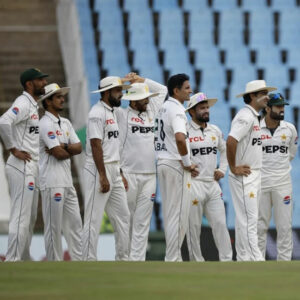
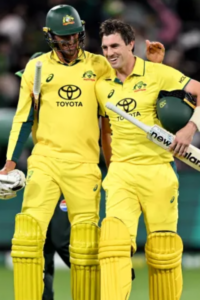
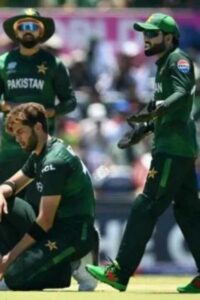
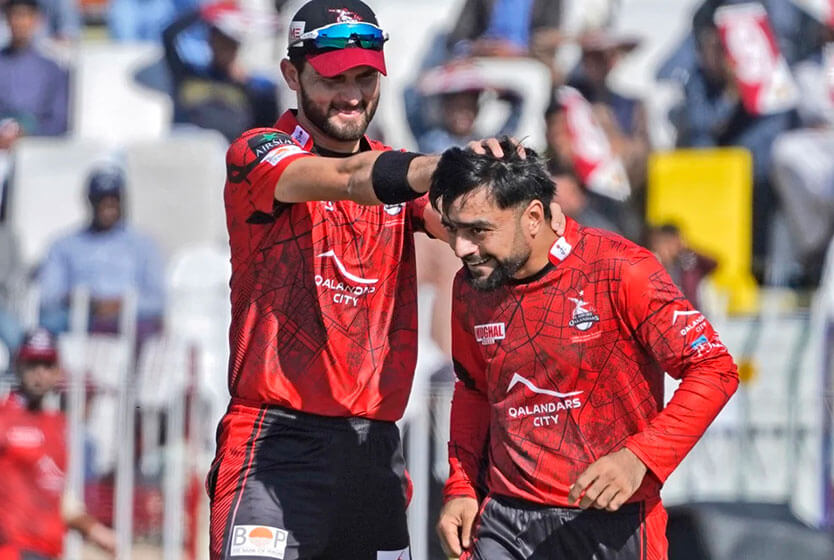
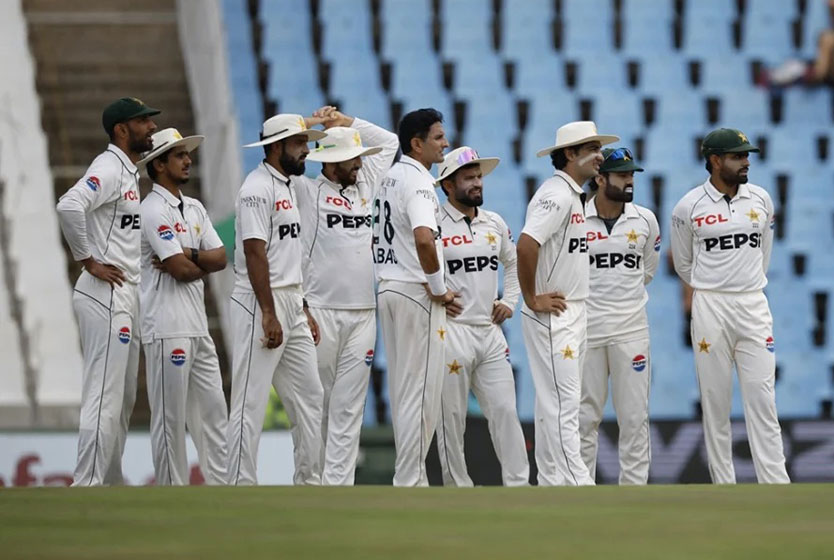
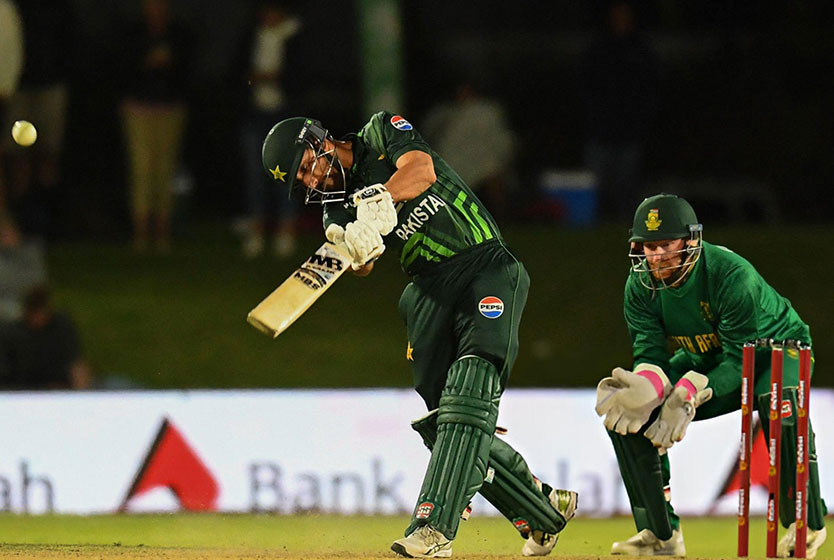
Leave a Reply